Unleashing Innovation: GDG Baroda's Google I/O Extended 2023 + Networking Connect
Table of contents
- 1) AI In Our Products
- 2) Making AI Helpful For Everyone
- 3) PaLM 2 and Gemini
- 4)AI responsibility: Tools to identify generated content
- 5) Updates to Bard and Workspace
- 6)Introducing Labs and our new Search Generative Experience
- 7)New hardware products:
- 8) New Tiny Features Introduced By Google, Which Are Fantastic
- Materials To Understand Google I/o 2023 Better
- Question:
Heyyy Everyone!!! 🎉🎉 I just went to the attend "Google I/O Extended Baroda 2023 + Networking Connect" event, hosted by the Google Developers Group (GDG) Baroda! 😃🚀
In this event, the new features rolled out by Google during "Google I/O 2023", conducted on May 10, 2023, were discussed.
The features they unveiled were AMAZING! 😍🎉 Google's Bard AI is now integrated into EVERY Google App like Sheets, Docs, Photos, and so much more! Can you believe it?! 🤯🚀 This is going to be a game-changer! 💥💯
Topics Discussed during the Event:
1) AI In Our Products
A) “Help me write” in Gmail
When it comes to pushing the boundaries of innovation, Gmail has consistently been at the forefront. One prime example is the introduction of generative AI, which has revolutionized our email experience. It all began in 2017 with the groundbreaking feature called Smart Reply. With a single click, users could choose from a selection of short, automated responses. This was followed by Smart Compose, which took things a step further by offering real-time writing suggestions as you typed. These AI-powered writing features quickly gained popularity and have been utilized a staggering 180 billion times in the past year within Workspace alone.
Now, building upon the success of Smart Compose, Gmail is unleashing its most powerful generative model yet with the advent of "Help me write." Picture this scenario: you receive an email notifying you that your flight has been canceled. The airline offers a voucher, but what you truly desire is a full refund. This is where "Help me write" comes to the rescue.
With a simple command, you can prompt the AI to create an email requesting a full refund. Just type in your desired message, hit create, and behold - a complete draft materializes before your eyes. The incredible part is that it seamlessly pulls in relevant flight details from the previous email, saving you valuable time and effort. While the initial draft might closely resemble what you intend to send, you can further refine it to increase the chances of a successful refund. Crafting a more elaborate email, thanks to the assistance of "Help me write," might just make all the difference.
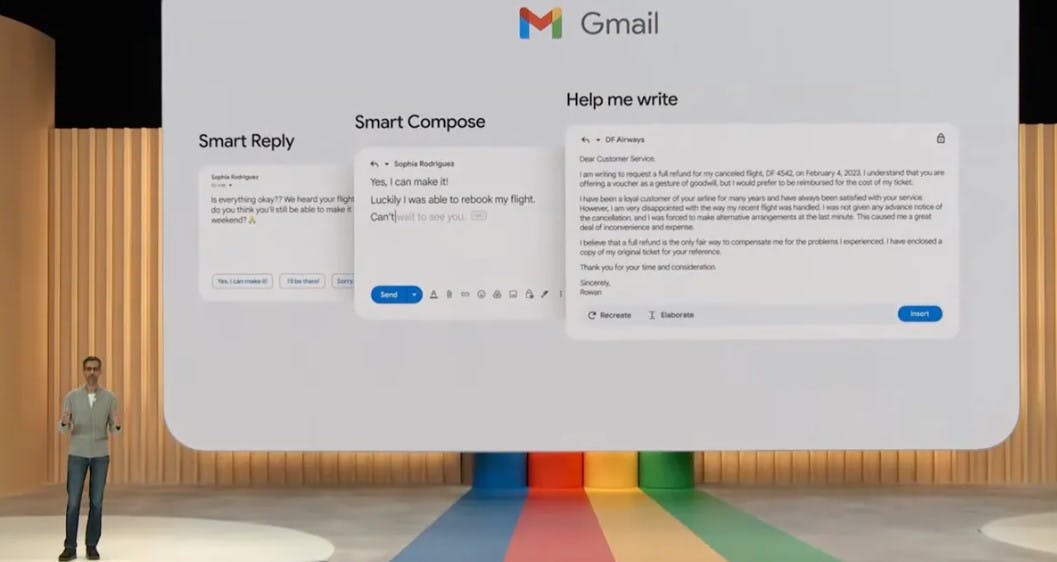
The arrival of "Help me write" is part of Gmail's ongoing commitment to enhancing Workspace and delivering cutting-edge features. Similar to its predecessor, Smart Compose, this new capability will continue to evolve and improve over time. With each iteration, "Help me write" will become even more refined, adapting to your writing style and specific needs.
In the ever-evolving landscape of email communication, Gmail's dedication to harnessing the power of generative AI is truly remarkable. By streamlining the writing process and empowering users with intelligent assistance, Gmail sets a new standard for efficiency and productivity.
B) New Immersive View for routes in Maps
Google Maps Introduces Immersive View for Routes
Since its inception, Street View has captivated users worldwide by stitching together countless panoramic images, allowing them to embark on virtual journeys and explore the far corners of our planet from the comfort of their own devices. Last year, at the much-anticipated I/O event, Google unveiled Immersive View - a groundbreaking feature that leverages the power of AI to create remarkably immersive representations of places, granting users the opportunity to experience them before setting foot in the physical world.
Building upon this revolutionary technology, Google is now expanding its capabilities to enhance one of its most beloved applications: Google Maps. Renowned for providing over 20 billion kilometers of daily directions, Google Maps has become an indispensable companion for travelers worldwide. And now, imagine being able to visualize your entire journey in advance - that's precisely what Immersive View for Routes offers, whether you're walking, cycling, or driving.
Let's take a scenario where you find yourself in the bustling streets of New York City, craving a memorable bike ride. Google Maps presents you with a couple of enticing options near your current location. One route along the waterfront catches your eye, but before making your decision, you want to get a genuine feel for what lies ahead. This is when an Immersive View of routes comes into play, revolutionizing the way you perceive your journey. By simply clicking on this innovative feature, you're transported to a whole new perspective. You can effortlessly zoom in and enjoy a breathtaking bird's-eye view of the entire route, immersing yourself in a virtual exploration like never before.
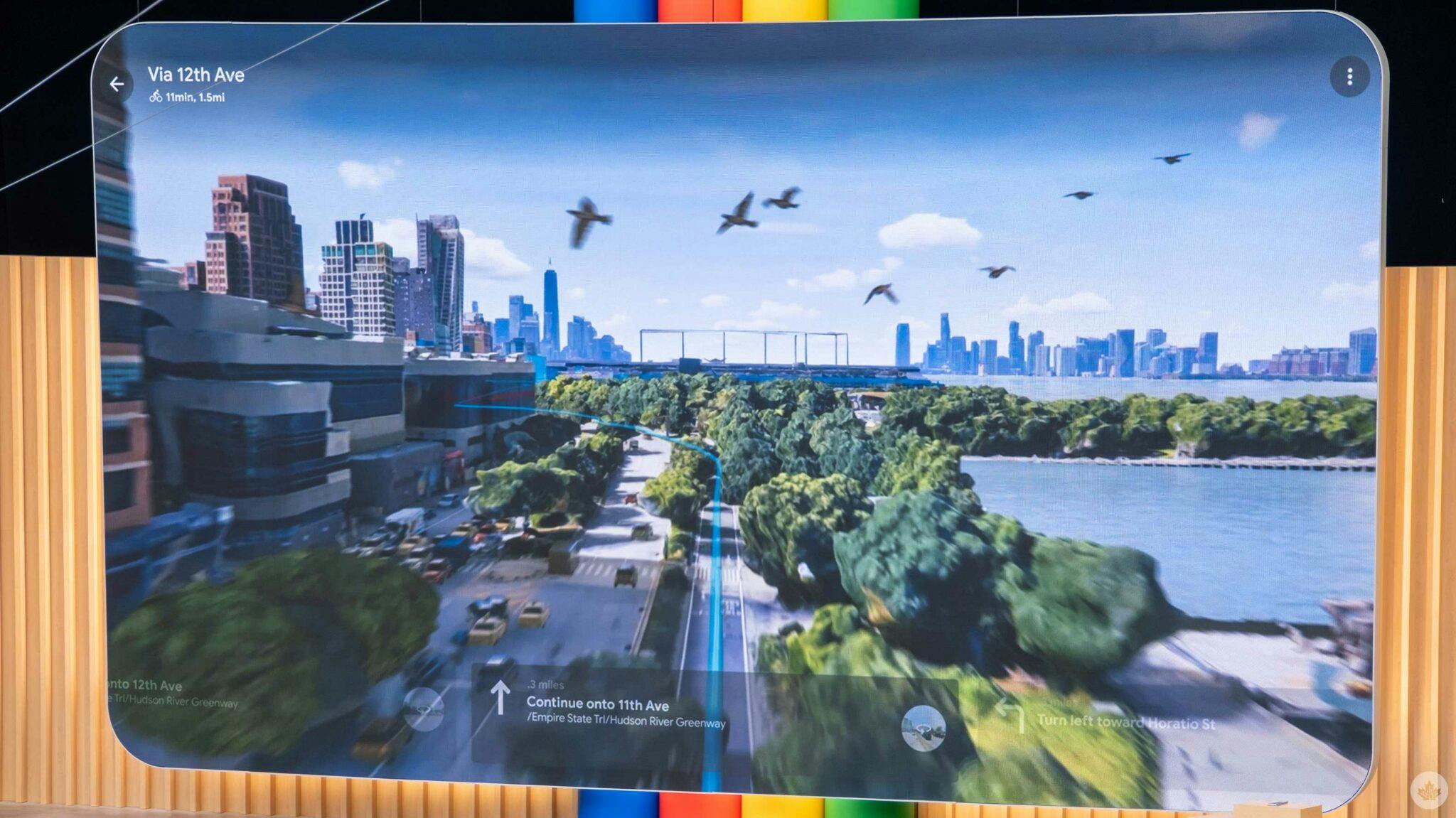
Immersive View for routes offers more than just visually stunning previews. It empowers you with essential information that enhances your planning process. Curious about the air quality, traffic conditions, or weather along your chosen route? Immersive View provides you with detailed insights, ensuring you're well-informed about potential changes and making your journey even more seamless and enjoyable.
Excitingly, Immersive View for routes will gradually roll out throughout the summer, initially launching in 15 vibrant cities by the end of this year. Iconic destinations such as London, New York, Tokyo, and San Francisco are among the lucky few to experience this groundbreaking feature firsthand. As the technology continues to evolve, Google Maps promises to expand its reach, allowing even more travelers worldwide to embark on their virtual explorations and make more informed decisions.
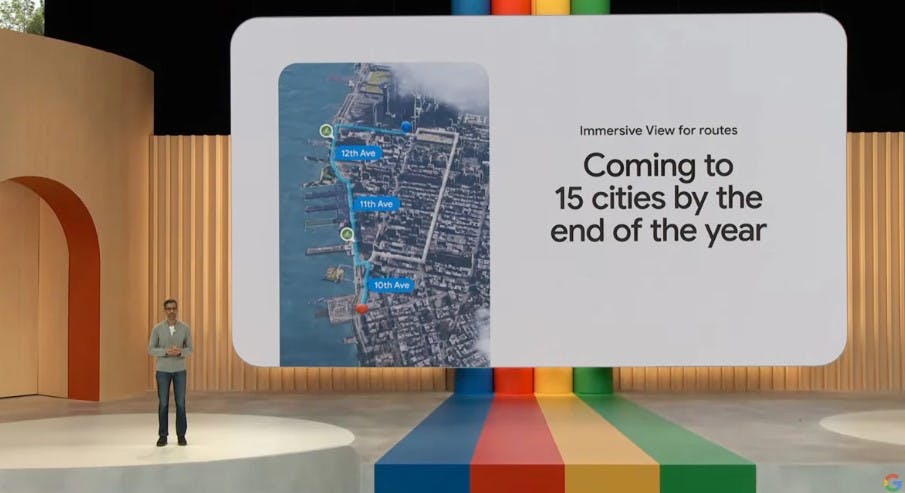
Get ready to embark on a journey like never before with Immersive View for routes, as Google Maps paves the way for a future where exploration and navigation seamlessly converge. Stay tuned for updates as this transformative feature makes its way to your city, opening new doors of discovery and adventure.
B) A new Magic Editor experience in Photos
When it comes to harnessing the power of AI, Google Photos stands out as a shining example. Introduced during the groundbreaking I/O event in 2015, it marked one of Google's first forays into AI-native products. Leveraging remarkable breakthroughs in machine learning, Google Photos redefined the way we interact with our cherished memories, allowing us to search for specific elements within our vast photo libraries, such as people, sunsets, or waterfalls.

Yet, Google's ambitions for Google Photos reach beyond mere searching capabilities; the goal is to empower users to take their photos to the next level. In fact, every month, an astonishing 1.7 billion images are edited using Google Photos. Thanks to continuous advancements in AI, the possibilities for enhancing your photos are becoming even more impressive. Take, for instance, the ingenious Magic Eraser feature, initially launched exclusively for Pixel devices. Powered by AI-driven computational photography, this feature allows you to effortlessly remove unwanted distractions from your pictures, delivering impeccable results.
However, Google doesn't stop at Magic Eraser. A new and exciting experience called Magic Editor is on the horizon, set to debut later this year. Combining the realms of semantic understanding and generative AI, Magic Editor opens up a world of possibilities for transforming your photos in truly awe-inspiring ways.
Imagine this scenario: You have a wonderful photo captured during a birthday celebration. As a doting parent, you naturally want your child to be the center of attention in the image. Additionally, you notice that the balloons were partially cut off in the shot. With Magic Editor, you can effortlessly reposition the birthday boy, ensuring he takes center stage. But that's not all. The AI-powered technology goes even further, automatically recreating the missing parts of the bench and the balloons, seamlessly blending them into the original composition. To add that extra touch of magic, you have the ability to enhance the sky, resulting in a stunning transformation that elevates the entire photo. The AI-driven adjustments even take into account the lighting and ensure a consistent, natural-looking edit. Witnessing the transformation unfold before your eyes is nothing short of magical.
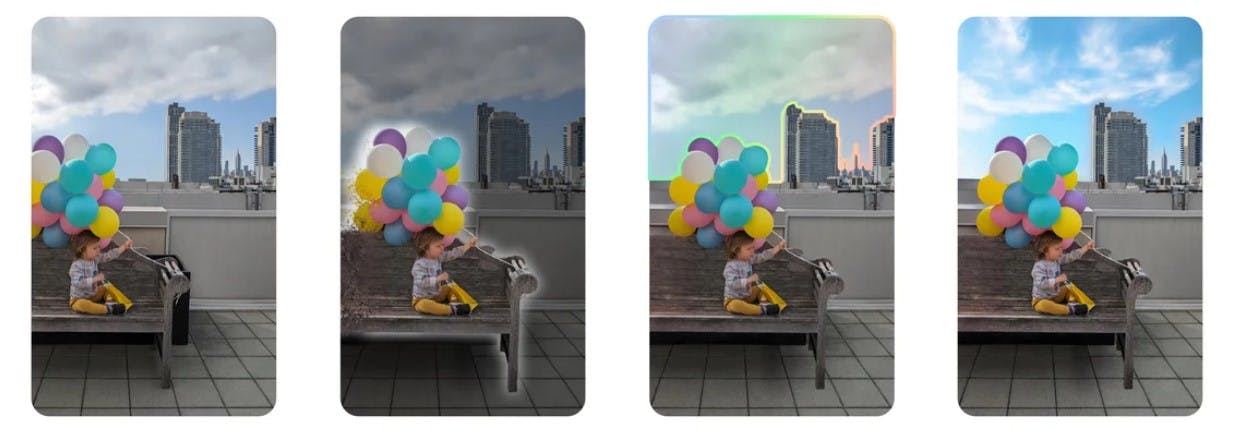
Excitement is building as Google plans to roll out Magic Editor in Google Photos later this year. This revolutionary feature will empower users to unleash their creativity and transform their ordinary photos into extraordinary works of art. Stay tuned for updates as Google continues to push the boundaries of AI-driven photo editing, unlocking new realms of possibility and granting you the tools to bring your cherished moments to life like never before.
2) Making AI Helpful For Everyone
Harnessing the Power of AI: Unlocking Boundless Possibilities
When it comes to enhancing our daily lives, AI has become an indispensable ally. From revolutionizing our communication with Gmail to transforming our photo editing experience with Photos, and even reimagining the way we navigate with Maps, AI has proven its potential to be a game-changer in the moments that truly matter. But let's not stop there—there is still so much untapped potential waiting to be explored across the array of products we hold dear.
As we stand today, Google boasts an impressive lineup of 15 products, each serving over half a billion people and businesses. Astoundingly, six of these products are catering to an astounding two billion users individually. Such wide-reaching influence provides us with countless opportunities to fulfill our mission: organizing the world's information and making it universally accessible and useful.
This timeless mission has only grown in significance with the passage of time. Looking towards the future, we believe that making AI helpful for everyone is the ultimate key to advancing our mission in the most profound way possible. We are committed to accomplishing this goal through four essential pillars:
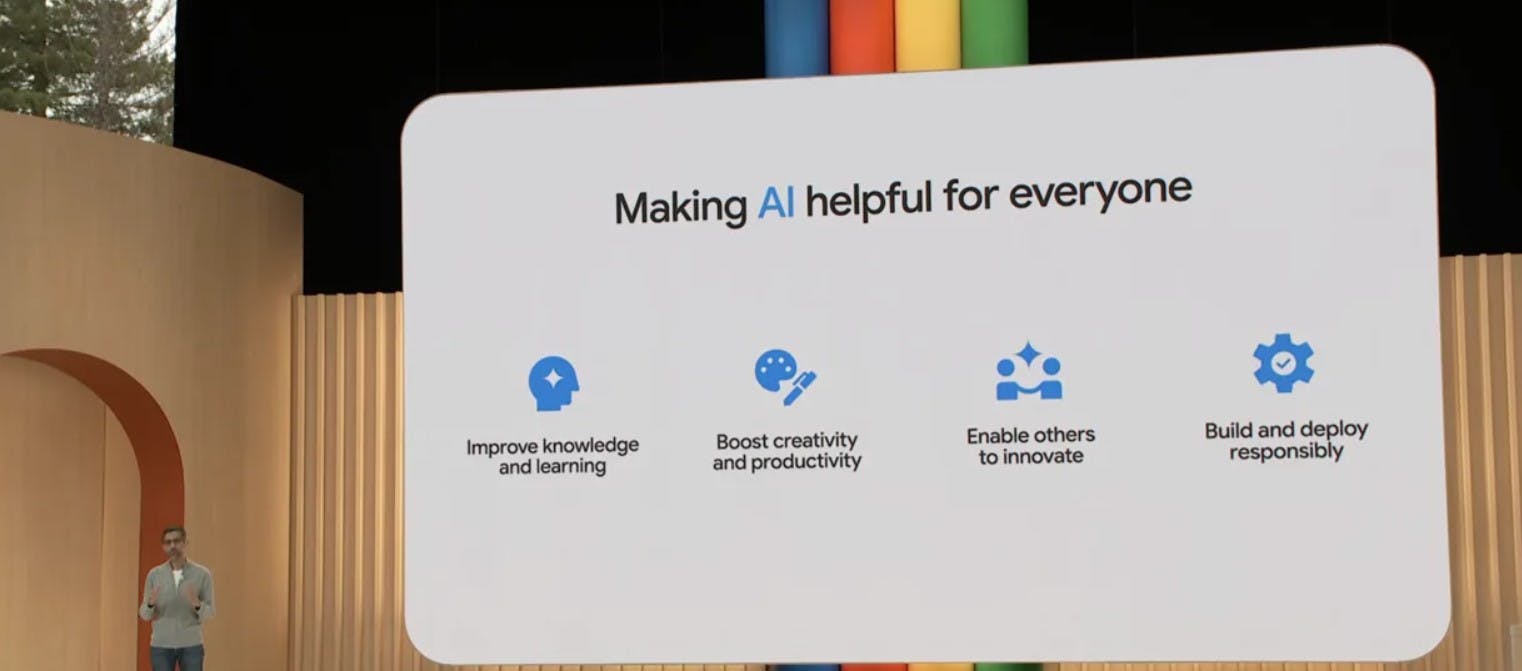
Firstly, Google aims to enhance your knowledge and learning by delving deeper into the intricacies of the world around us. By leveraging the power of AI, we seek to provide you with a greater understanding of the vast wealth of information at your fingertips.
Secondly, Company'ss focus is on boosting your creativity and productivity, empowering you to express yourself freely and accomplish your goals efficiently. Through AI-driven innovations, we aim to remove barriers and unleash your full potential.
Thirdly, we are dedicated to empowering developers and businesses, granting them the tools and resources needed to build their own transformative products and services. By democratizing access to AI technologies, we aim to foster a culture of innovation and unlock endless possibilities.
Lastly, the Company's commitment lies in building and deploying AI responsibly. We understand the significance of equitable access and strive to ensure that the benefits of AI are enjoyed by all. By adhering to ethical principles and implementing responsible practices, we aim to create a future where AI serves as a force for good, benefiting society as a whole.
3) PaLM 2 and Gemini
The future of AI is brimming with excitement and endless possibilities. At the heart of our mission to make AI truly helpful for everyone lies the continuous advancement of our foundation models. Today, I'm thrilled to share with you the latest breakthrough in this realm: the highly anticipated PaLM 2 model.
Building upon our extensive research and leveraging state-of-the-art infrastructure, PaLM 2 represents a significant leap forward in AI capabilities. With its remarkable versatility and ease of deployment, this cutting-edge model is set to redefine the landscape of AI-powered solutions. In fact, we are proud to announce that more than 25 products and features are already powered by PaLM 2, showcasing its remarkable potential.
The PaLM 2 models have been meticulously designed to deliver exceptional foundational capabilities across a diverse range of sizes. To add a touch of whimsy, we have affectionately assigned names to these models: Gecko, Otter, Bison, and Unicorn. Gecko, in particular, is a lightweight marvel, capable of operating seamlessly on mobile devices. Its agility enables lightning-fast, interactive on-device applications, even in offline environments.
One of the standout features of the PaLM 2 models lies in their enhanced logic and reasoning capabilities, a result of comprehensive training on scientific and mathematical subjects. Additionally, these models have been trained on multilingual text spanning over 100 languages, enabling them to understand and generate nuanced results with astonishing accuracy.
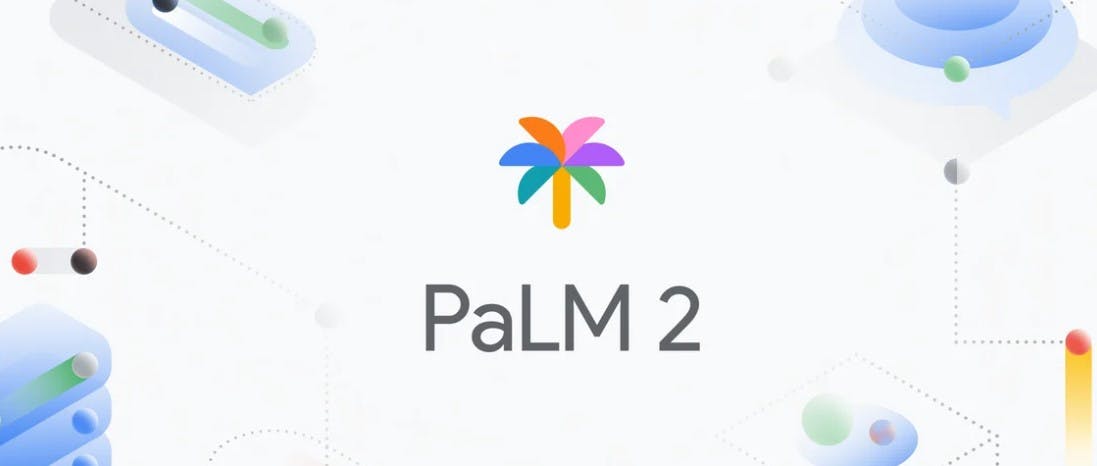
With its powerful coding capabilities, PaLM 2 also empowers developers to collaborate effortlessly across borders. Picture this: You find yourself collaborating with a colleague in Seoul, jointly debugging a piece of code. By simply instructing PaLM 2 to fix a bug and add comments in Korean, you unlock a world of possibilities. The model intelligently recognizes the recursive nature of the code, suggests an appropriate fix, and goes the extra mile to explain the reasoning behind the solution. As requested, it effortlessly incorporates Korean comments into the code, helping you seamlessly collaborate with your teammate.
The arrival of PaLM 2 heralds a new era in AI foundation models, revolutionizing the way we harness the power of AI in our daily lives. Its exceptional capabilities, coupled with its multilingual prowess and powerful coding assistance, make it an invaluable asset for developers, researchers, and users alike.
As we forge ahead, we remain committed to pushing the boundaries of what AI can achieve while ensuring its responsible and ethical deployment. The potential of PaLM 2 and its contribution to the advancement of AI is indeed thrilling prospects, ones that will undoubtedly shape the future of technology in remarkable ways.
4)AI responsibility: Tools to identify generated content
Google is firmly dedicated to the responsible use of AI, which encompasses the development of tools to recognize synthetically generated content whenever it is encountered.
Two significant methods for this purpose are watermarking and metadata.
Watermarking involves embedding information directly into the content in a manner that remains intact even after minor image editing. As we progress, our models will be designed to integrate watermarking and other techniques from the outset. Given the striking realism of synthetic images, the importance of such measures in the future cannot be overstated.
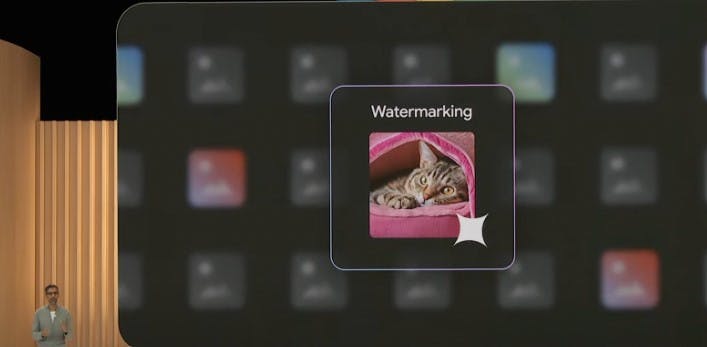
Metadata enables content creators to attach supplementary context to original files, offering users additional information whenever they come across an image. We are committed to ensuring that all AI-generated images produced by our models include this metadata.
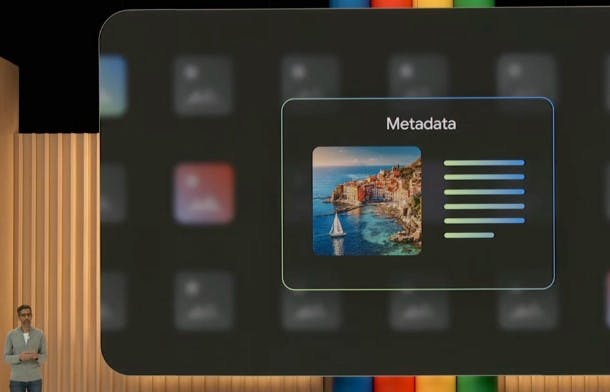
5) Updates to Bard and Workspace
As AI models advance and become more proficient, the potential to make them accessible for direct user engagement is increasingly appealing.
This potential is embodied by Bard, our experimental conversational AI, introduced in March. Bard has undergone rapid development, now boasting an extensive array of programming capabilities, enhanced reasoning and mathematical skills. As of today, Bard operates entirely on PaLM 2.
Furthermore, we are introducing new features to Google Workspace. Alongside the "Help me write" function in Docs and Gmail, Duet AI extends its capabilities to Google Workspace, offering tools such as generating images from textual descriptions in Slides and Meet, devising customized plans in Sheets, and more.
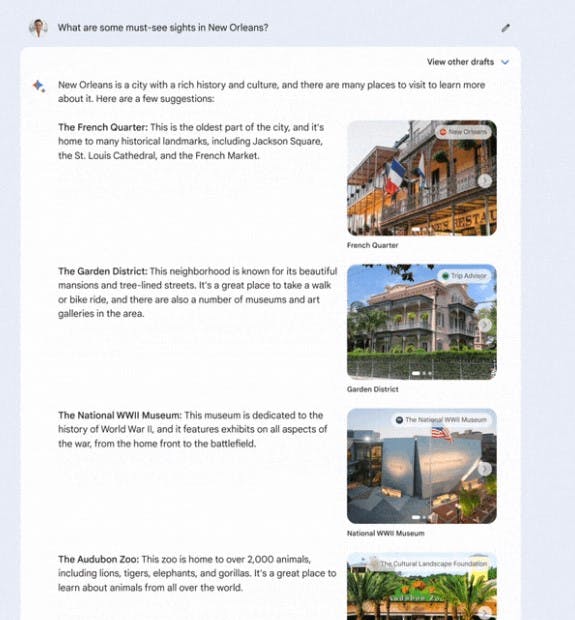
6)Introducing Labs and our new Search Generative Experience
Introducing Labs and the New Search Generative Experience
As artificial intelligence (AI) continues to advance, our focus remains on providing valuable features to our users. Today, we introduce Labs, a platform that allows users to preview and provide feedback on various experiences across Workspace and other products. Google has a long-standing tradition of utilizing Labs to facilitate early access and gather user feedback, and sign-ups will be available later today.
In addition to the Workspace features mentioned earlier, one of the first experiences available for testing in Labs will be related to our founding product, Google Search. Our deep investment in AI over the years stems from our desire to enhance Search, making it more helpful and intuitive with each breakthrough.
Enhancements in language understanding enable users to ask questions more naturally and access the most relevant content on the web. Progress in computer vision has paved the way for visual search capabilities. With Google Lens, users can now search for anything they see, even if they cannot describe it in words. Lens currently facilitates over 12 billion visual searches per month, marking a 4X increase in just two years. The integration of Lens with multimodality has given rise to multi-search, allowing users to search using both images and text.
Dark Theme is enabled in Bard Google
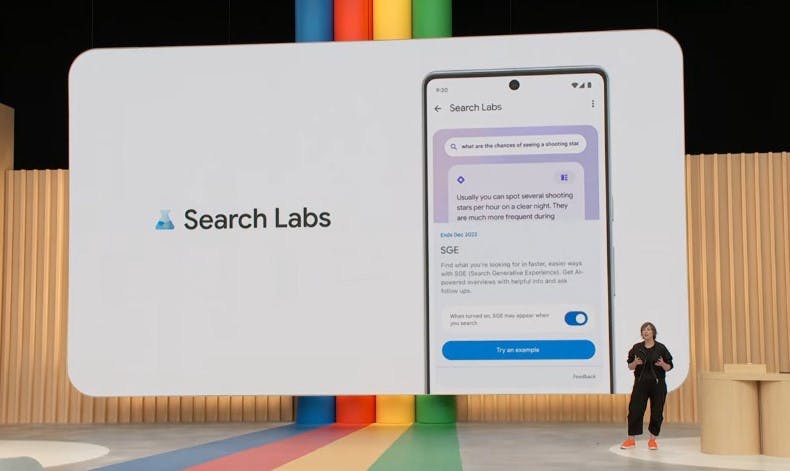
7)New hardware products:
Google has unveiled a variety of new hardware products, encompassing:
Pixel Fold: The Pixel Fold is Google's first foldable phone. It features a 7.6-inch internal display and a 5.8-inch external display.
Pixel Tablet: The Pixel Tablet is Google's first tablet. It features a 10.2-inch display and a Google Tensor chip.
Pixel 7A: The Pixel 7A is Google's latest mid-range phone. It features a 6.1-inch OLED display, a Google Tensor chip, and a 50MP rear camera.
8) New Tiny Features Introduced By Google, Which Are Fantastic
LaMDA:
LaMDA is a new AI language model that is built on the Transformer architecture. It is trained on a massive dataset of text and code, and it can generate text, translate languages, write different kinds of creative content, and answer your questions in an informative way. LaMDA is still under development, but it has the potential to revolutionize the way we interact with computers.
New search features: Google announced a number of new features for its search engine, including:
Personalized results: Google will now personalize search results based on your interests and browsing history.
More relevant results: Google will now use AI to improve the relevance of search results.
New ways to interact with search results: Google will now allow you to interact with search results in new ways, such as by asking questions and getting answers.
New Android features:
Google announced a number of new features for its Android operating system, including:
New design language: Android 14 will feature a new design language called Material You. Material You will allow you to customize the look and feel of your Android device based on your wallpaper.
New privacy features: Android 14 will include a number of new privacy features, such as a new privacy dashboard that will allow you to see how apps are using your data.
New AI-powered machine learning engine:
Google announced a new AI-powered machine learning engine called Cloud TPU v4. Cloud TPU v4 is designed to accelerate machine learning workloads, and it is up to 40 times faster than previous generations of Cloud TPUs.
Materials To Understand Google I/o 2023 Better
1) Google KeyNote (Google I/O 23)
2) Google I/O '23 In Under 10 Min
Question:
How Is AI Going To Transform Your Life? Is it going to affect your Jobs, if Yes, How will you overcome it? Put Your Thoughts In The Comments Down Below
